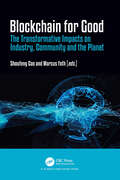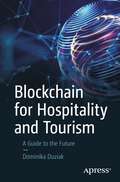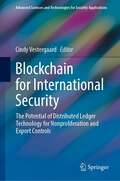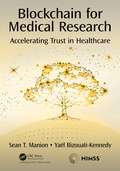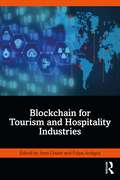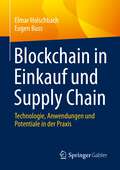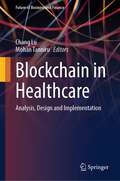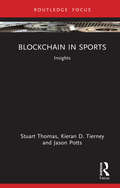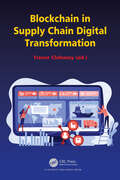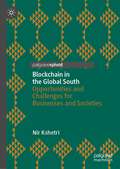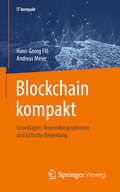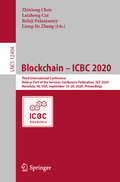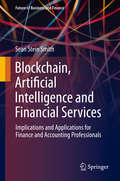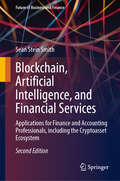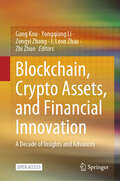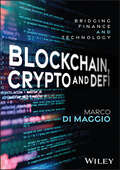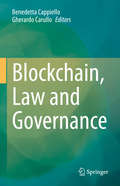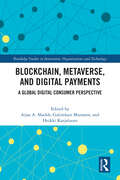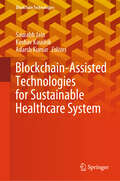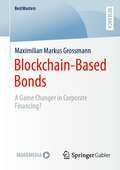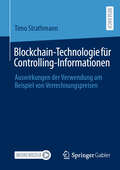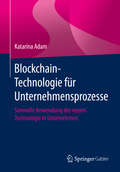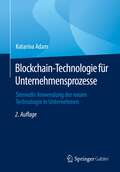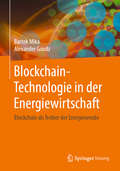- Table View
- List View
Blockchain for Good: The Transformative Impacts on Industry, Community and the Planet
by Marcus Foth Shoufeng CaoBlockchain, a technology originally developed for cryptocurrency, has evolved into a versatile tool capable of driving significant change across industries and communities. Its decentralised, secure, and transparent nature has proven valuable in applications that transcend finance, impacting supply chains, digital governance, and sustainability practices. By enabling greater trust and accountability, blockchain technology can foster ethical solutions to global challenges, promoting transparency, inclusivity, and efficiency within sectors like agriculture, healthcare, and environmental management. This book explores blockchain’s role as a catalyst for meaningful change and its potential to contribute positively to our digital future.Structured into three parts—Industry, Community, and Planet—this book examines blockchain’s role in advancing (i) sustainable business practices, (ii) supporting fairer social systems, and (iii) addressing environmental goals. Each section presents diverse case studies and theoretical insights, showing how blockchain can be applied responsibly and ethically. From enhancing transparency in fashion supply chains to supporting smallholder farmers, and from reshaping public governance to promoting the circular economy, the book offers a thorough understanding of blockchain’s transformative capabilities. It highlights interdisciplinary research and applied projects across the globe that exemplify blockchain’s capacity to serve societal and environmental purposes.Ideal for researchers, policymakers, and industry professionals, this book provides practical insights into blockchain’s potential beyond the hype. Whether you are in technology, social sciences, or environmental studies, Blockchain for Good serves as an essential resource for anyone interested in exploring how blockchain can contribute to a more equitable and sustainable world.
Blockchain for Hospitality and Tourism: A Guide to the Future
by Dominika DuziakLearn blockchain in a simple, non-tech way and explore the different emerging technologies that open a world of opportunities in the space of tourism and hospitality. This book showcases examples of blockchain-based solutions implemented in different industries and connects them to use cases in hospitality and tourism (disintermediation, payments, loyalty programs, supply chain management, identity management etc.). Blockchain is one of the disruptive technologies that lays foundations for Web3.0, NFTs, Metaverse and other innovations. Despite many benefits, its adoption in the hospitality industry is very slow. Lack of awareness and connection to clear return-on-investment, coupled with many misconceptions and general perception of complexity is one of the main reasons why hospitality managers are reluctant to embark on the blockchain train.Blockchain for Hospitality and Tourism serves as a practical guide to the world of innovations, from the basics of blockchain to “how to start a project” with brief explanations of different technologies and capabilities. You'll review NFTs and Metaverse, along with current developments, tools, and platforms. After reading this book, you'll be equipped with enough knowledge to make strategic business decisions and able to discuss these topics within your organization and with vendors and suppliers in a comfortable way. As blockchain enters the next phase of its evolution, with more user-friendly interfaces and interoperability, see how it opens a world of opportunities in the space of tourism and hospitality. What You'll LearnBlockchain-based innovations – cryptocurrencies and digital asset management, NFTs, Web3.0, Metaverse)Review applications of blockchain in selected industries Start a blockchain project Who This Book is ForHospitality professionals, including hotel managers and general managers, revenue management directors, operations directors, hotel IT managers, asset managers, brand strategy managers, marketing managers. Hospitality students will benefit as well. ·
Blockchain for International Security: The Potential of Distributed Ledger Technology for Nonproliferation and Export Controls (Advanced Sciences and Technologies for Security Applications)
by Cindy VestergaardThis book intersects the distributed ledger technology (DLT) community with the international security community. Given the increasing application of blockchain technology in the fields of business and international development, there is a growing body of study on other use cases. For instance, can blockchain have a significant role in preserving and improving international security? This book explores this question in the context of preventing the proliferation of some of the most dangerous materials in the world—items that if not secured can lend to the development of weapons of mass destruction. It considers how blockchain can increase efficiencies in the global trade of nuclear and chemical materials and technology, thereby increasing assurances related to compliance with international nonproliferation and disarmament treaties.
Blockchain for Medical Research: Accelerating Trust in Healthcare
by Sean T. Manion Yaël Bizouati-KennedyIt takes 17 years on average to bring new medical treatments ideas into evidence-based clinical practice. The growing replicability crisis in science further delays these "new miracles." Blockchain can improve science and accelerate medical research while bringing a new layer of trust to healthcare. This book is about science, its value to medicine, and how we can use blockchain to improve the quality and impact of both. The book looks at science and medicine from an insider’s perspective and describes the processes, successes, shortcomings and opportunities in an accessible way for a broad audience. It weaves this a non-technical look at the emerging world of blockchain technology; what it is, where it is useful, and how it can improve science and medicine. It lays out a roadmap for this application to transform how we develop knowledge about health and medicine to improve our lives. In the first part, Blockchain isn’t Tech, the authors look at blockchain/distributed ledger technology along with critical trade-offs and current explorations of its utility. They give an overview of use cases for the technology across industries, including finance, manufacturing and healthcare, with interviews and insights from leaders across government, academia, and tech/health industry both big and start-up. In the second part, Science is Easy, the authors look at science as a process and how this drives advancement in medicine. They shed a light on some of science’s shortcomings, including the reproducibility crisis and problems with misaligned incentives (i.e. publish or perish). They apply a breakdown of critical components to the functional steps in the scientific process and outline how the open science movement is looking to improve these, while highlighting the limit of these fixes with current technology, incentives and structure of science. In the third part, DAO of Science, the authors look at how blockchain applied to open science can impact medical research. They examine how this distributed approach can provide better quality science, value-based research and faster medical miracles. Finally, they provide a vision of the future of distributed medical research and give a roadmap of steps to get there.
Blockchain for Tourism and Hospitality Industries
by Irem Onder Fulya AcikgozThis insightful book is the first to explain the basics of blockchain and its applications in the service industry, as well as potential future implementations of the technology. Embellished with explanatory diagrams throughout, this book predominantly focuses on blockchain as a prominent driver of digital transformation within the service sector and explores its potential applications within the tourism and hospitality industries. Expert-led and logically structured, the chapters explore a plethora of concepts within the service industry and explain the possibilities of blockchain technology and its pros and cons. Key topics include blockchain and its current and potential future impact on food and agricultural supply chains, the sharing economy, non-fungible tokens (NFTs), financial systems and payments, medical tourism, sustainability, and smart contracts. The book seeks to inspire and influence industry figures to plan ahead and develop business strategies using blockchain. International in scope, this engaging volume will be of pivotal interest to industry experts as well as researchers and tourism, hospitality, and technology students interested in learning more about blockchain and its potential for the service industry.
Blockchain in Einkauf und Supply Chain: Technologie, Anwendungen und Potentiale in der Praxis
by Elmar Holschbach Eugen BussDas Buch führt anschaulich und spielerisch in die Blockchain-Technologie ein. Es beschreibt und kategorisiert häufiger anzutreffende Blockchain-Anwendungen in Einkauf und Supply Chain Management. Dadurch wird Praktikern ermöglicht, besser zu entscheiden, für welche ihrer Herausforderungen die Blockchain-Technologie geeignete Lösungsansätze bieten kann. Darüber hinaus gibt das Buch den Lesern ein Instrument zur Auswahl und Gestaltung der für ihre Anwendungsfälle geeigneten Blockchain-Technologie an die Hand. Auf Basis zahlreicher Praxisbeispiele werden dabei sowohl technologische (Potential und Reifegrad der Blockchain-Technologie) als auch betriebswirtschaftliche (Kosten) und organisatorische (Entwicklung und Betrieb) Aspekte berücksichtigt.
Blockchain in Healthcare: Analysis, Design and Implementation (Future of Business and Finance)
by Chang Lu Mohan TanniruThis books brings readers a holistic understanding of blockchain adoption in healthcare by not only considering the technical fundamentals of use cases, but also the regulatory, informational and organizational challenges and solutions. The book also provides frameworks and toolkits to manage the entire life cycle of adoption, including analysing the environment and feasibility, application design from a user-centred perspective, and implementation strategies that would overcome organizational and informational barriers. Specific issues addressed include but are not limited to: How to analyse the value propositions in healthcare and which distributed actors should be engaged to fulfil these propositions? What policies and practices need to be reviewed to ensure security and privacy of the information shared? How to design blockchain systems that seamlessly integrate with other stakeholder applications, while only the needed information is in the distributed architecture? How can blockchain implementation be managed from governance and risk mitigation perspectives, especially when multiple actors are involved?By reading this book, blockchain enthusiasts, health informatics professionals and healthcare executives will be better prepared to leverage the transformative potential of blockchain for healthcare.
Blockchain in Sports: Insights (Sport Business Insights)
by Stuart Thomas Kieran D. Tierney Jason PottsThis is the first book to examine the impact of blockchain technology on the business of sport. It introduces the fundamentals of blockchain and explores its current and prospective applications in sport, as well as the implications – both positive and negative – of blockchain for the future of the global sport industry.The book opens by explaining how blockchain works, assuming no prior knowledge on the part of the reader, and introduces the most important aspects of blockchain in practice, such as non-fungible tokens (NFTs) and decentralised autonomous organisations (DAOs), as well as new ways of gathering data, such as the Internet of Things, that interact with blockchain infrastructure. The book then examines blockchain in relation to functional areas of sport business, including marketing and fan engagement, athlete contracting and doping records, sport betting markets, fantasy leagues, and esports.This is essential reading for anybody with an interest in sport business and management, e-commerce, or the impact of new technologies on the economy and wider society.
Blockchain in Supply Chain Digital Transformation
by Trevor ClohessyBlockchain and distributed ledger technology (DLT) have been identified as emerging technologies that can enhance global supply chain management processes. Given the embryonic nature of the technology, use cases pertaining to how it can be adopted and deployed in supply chain contexts are scarce. This book shares blockchain supply chain use cases across a range of industries including smart cities, food imports, product traceability, decentralised finance, procurement, energy management, consensus mechanism security, and industry 4.0. Given its scope, it is primarily intended for academics, students, researchers, and practitioners who want to learn more about how blockchain can digitally transform global supply chains.
Blockchain in the Global South: Opportunities and Challenges for Businesses and Societies
by Nir KshetriThis book discusses the unique and unusual characteristics of the blockchain and the industries and markets affected by this technology in the Global South. Its main objectives are to 1) provide a comprehensive review of economic, health, social, political, entrepreneurial, and environmental impacts of blockchain, 2) present evidence from countries, industries, and firms to broaden the understanding of the contexts, mechanisms, and outcomes associated with blockchain projects, and 3) analyze the enablers and opportunities that can be tapped and barriers that may impede the implementation of blockchain projects in these economies.Given that in many way blockchain has a much higher value proposition for economies in the Global South than for their counterparts in the more developed Global North, it has the potential to make up for the lack of effective formal institutions — rules, laws, regulations, and their enforcement — as well as improve administrative aspects, such as maintenance of standards, monitoring and compliance. This work fills a gap in scholarly research and will appeal to researchers interested in the potential of blockchain to boost entrepreneurship, reshape governance, improve supply chain efficiency, and curb corruption in emerging economies.
Blockchain kompakt: Grundlagen, Anwendungsoptionen und kritische Bewertung (IT kompakt)
by Andreas Meier Hans-Georg FillLernen Sie in diesem Fachbuch mehr über die Grundlagen von BlockchainSie interessieren sich für Kryptowährungen durch Blockchain-Technologie? Aber irgendwie erscheint Ihnen die Thematik wie ein Buch mit sieben Siegeln? Dieses Fachbuch von Hans-Georg Fill und Andreas Meier liefert Ihnen einen Überblick rund um Blockchain. Es erläutert detailliert und übersichtlich die Grundlagen zu folgenden Themenfeldern:Datenstrukturen wie Hash-Funktionen und -BäumeDigitale SignaturFunktionenKonsensalgorithmenetc.Blockchains sind jedoch nicht nur ein Teil von Kryptowährungen. Es handelt sich um ein digitales Buchungssystem. Die Technologie von Ethereum ist daher für viele Unternehmen äußerst interessant (Stichwort Smart Contracts, Smart Grid, Smart Cities). Das Fachbuch über Blockchain ist somit genau das Richtige für Sie, wenn Sie Verbesserungen im eigenen Unternehmen, der Verwaltung oder im öffentlichen Leben vornehmen oder alternative Lösungen angehen wollen.Konzepte und Anwendungen der KryptographieIn den sechs Kapiteln des Fachbuches über Blockchain liefern Ihnen die Autoren Antworten auf verschiedene rechtliche Fragen. Sie befassen sich im Rahmen ihrer Ausführungen kritisch mit der Blockchain-Technologie und zeigen Ihnen wichtige Anwendungsoptionen. Sie erhalten einen fundierten Überblick über folgende Themenfelder:Motivation Betrugsprävention Grundlagen zur Blockchain-Technologie Aufbau und Funktion der BlockchainAnwendungsoptionen Rechtliche FragenKritische EinschätzungDieses Fachbuch über Blockchain richtet sich an Führungsverantwortliche, Projektleiter und Interessierte, die sich einen Überblick über das Potenzial der Blockchain-Technologie verschaffen möchten.
Blockchain – ICBC 2020: Third International Conference, Held as Part of the Services Conference Federation, SCF 2020, Honolulu, HI, USA, September 18-20, 2020, Proceedings (Lecture Notes in Computer Science #12404)
by Liang-Jie Zhang Balaji Palanisamy Zhixiong Chen Laizhong CuiThis book constitutes the proceedings of the Third International Conference on Blockchain, ICBC 2020, held as part of SCF 2020, during September 18-20, 2020. The conference was planned to take place in Honolulu, HI, USA and was changed to a virtual format due to the COVID-19 pandemic. The 14 full paper and 1 short paper presented were carefully reviewed and selected from 26 submissions. They deal with all topics regarding blockchain technologies, platforms, solutions and business models, including new blockchain architecture, platform constructions, blockchain development and blockchain services technologies as well as standards, and blockchain services innovation lifecycle including enterprise modeling, business consulting, solution creation, services orchestration, services optimization, services management, services marketing, business process integration and management.
Blockchain, Artificial Intelligence and Financial Services: Implications and Applications for Finance and Accounting Professionals (Future of Business and Finance)
by Sean Stein SmithBlockchain technology and artificial intelligence (AI) have the potential to transform how the accounting and financial services industries engage with the business, stakeholder and consumer communities. Presenting a blend of technical analysis with current and future applications, this book provides professionals with an action plan to embrace and move forward with these new technologies in financial and accounting organizations. It is written in a conversational style that is unbiased and objective, replacing jargon and technical details with real world case examples.
Blockchain, Artificial Intelligence, and Financial Services: Applications for Finance and Accounting Professionals, including the Cryptoasset Ecosystem (Future of Business and Finance)
by Sean Stein SmithBlockchain, cryptoassets, and artificial intelligence protocols continue to change the roles of accounting and financial service professionals at a fundamental level. This book examines the impact and influence of these technologies in the financial sector. In particular, this second revised edition examines the impact of these technologies on megatrends such as ESG reporting, remote workforces, real-time reporting, and a shift to a virtual and digital world. It also provides insights on how automation of all kinds—highlighted by AI—are changing the ways in which financial transactions and other information are handled by accounting and finance professionals. Ranging from the implications of blockchains among various organizations, to the rise of cryptoassets for transactions and investing activities, the author provides grounded and action-oriented recommendations for financial practitioners. Written in an accessible, conversational style that is unbiased and objective, and replaces jargon and technical details with real-world case examples and end-chapter reflection questions, this book presents professionals, as well as students, scholars, and policy makers, with the knowledge and action plans to integrate these ideas and tools into practice within accounting and finance organizations.
Blockchain, Crypto Assets, and Financial Innovation: A Decade of Insights and Advances
by Gang Kou J. Leon Zhao Yongqiang Li Zongyi Zhang Zhi ZhuoThis open access book provides a decade-spanning, meticulously curated collection of research that showcases groundbreaking advances in blockchain, cryptocurrency, digital finance, and market volatility. Through empirical studies, predictive models, and comprehensive reviews, this book reveals the evolution of financial innovation over the past decade, highlighting blockchain as a transformative direction alongside other pivotal advancements, with both theoretical insights and actionable applications. With its pioneering focus on emerging topics—such as innovative blockchain applications in finance, the rise of tokens and NFTs as digital assets, and cryptocurrency market dynamics—this book delves into cutting-edge financial phenomena rarely covered in traditional finance literature. Spanning complexities from market dynamics, volatility, and spillover effects to the evolving regulatory landscape for crypto adoption, it provides readers with a comprehensive understanding of blockchain's role in modern finance. Intended for researchers, academics, policy makers, and finance professionals, this book balances rigorous academic research with real-world applicability, providing insights that appeal to both scholarly and practical perspectives. Key benefits include a unique mix of strategic advances in financial innovation and actionable research insights for navigating its evolving landscape.
Blockchain, Crypto and DeFi: Bridging Finance and Technology
by Marco Di MaggioUnlock the future of finance with Blockchain, Crypto, and DeFi Step into the realm of blockchain and cryptocurrency like never before with Blockchain, Crypto, and DeFi: Bridging Finance and Technology. Crafted by Marco Di Maggio, not just a Harvard Professor of Finance but an esteemed advisor to giants like Coinbase, this is your roadmap from foundational theories to cutting-edge applications. This is far from an academic discourse detached from reality; it seamlessly integrates theory with practice through detailed case studies and practical coding tutorials. Navigating the digital landscape today demands more than just passing familiarity with the latest technologies. Delving deep into blockchain and cryptocurrencies has become a pivotal skill set for anyone looking to thrive in this constantly shifting digital era. Whether you're a student aiming for a career in finance and technology, an academic seeking to expand your knowledge base, or a professional looking to stay ahead of the curve, this textbook offers unparalleled insights into the mechanics and implications of blockchain technologies. What Sets This Book Apart: Expertise Beyond the Classroom: Direct from the boards of the crypto world's titans, this book offers comprehensive coverage ensuring the book stands as an indispensable industry reference. Theory Meets Practice: Engage with complex blockchain concepts through practical case studies and coding tutorials. Learn, Build, Invest: Equip yourself to navigate the industry as an investor, entrepreneur, or innovator. Master the art of assessing protocols, crafting your own, and seizing opportunities in the blockchain and crypto space. Wit Meets Wisdom: Enjoy the journey with a narrative that combines profound insights with a witty tone, ensuring both enlightenment and entertainment. Blockchain, Crypto, and DeFi is not just a textbook but a journey into the heart of digital finance, marked by Di Maggio's engaging style and deep expertise. Accompanied by additional online resources, including slide decks and tutorials, this book is your go-to resource and your gateway to mastering the blockchain revolution. Embark on your blockchain adventure today. Table of Contents Chapter One: Chain Reactions: From Basement Miners to Blockchain Revolutionaries Chapter Two: Ethereum: The “Windows” to the Blockchain Universe – Now Loading Smart Contracts and Oracle Magic Chapter Three: Beyond Ethereum: A Gas-Guzzling Escape to the Holy Grail of Scalability Chapter Four: Riding the Crypto Rollercoaster: How Stablecoins Keep Their Cool Chapter Five: The CBDC Saga: Rewriting the Rules of Money Chapter Six: Money Grows on Distributed Trees: The DeFi Forest of DAOs and DApps Chapter Seven: The AMM Time machine: Back to the Future of Finance Chapter Eight: Liquidity Pools: Dive Deep into the Ocean of DeFi (Lifebuoys Not Included) Chapter Nine: The Tokenization Transformation from Wall Street to Your Street Chapter Ten: Digital Da Vincis: The Renaissance of Art in the Age of NFTs Chapter Eleven: Regulatory Framework: Work in Progress Chapter Twelve: Beyond HODL: Mastering the Art and Science of Crypto Trading Chapter Thirteen: Game Over for Bankers: The Unlikely Rise of Sofa-Surfing Capitalists Chapter Fourteen: Branding on the Block: How
Blockchain, Cryptocurrencies and Digital Assets
by Ramana Nanda Robert F. White Alexey TuzikovIndustry and Background Note
Blockchain, Law and Governance
by Benedetta Cappiello Gherardo CarulloThis volume explores from a legal perspective, how blockchain works. Perhaps more than ever before, this new technology requires us to take a multidisciplinary approach. The contributing authors, which include distinguished academics, public officials from important national authorities, and market operators, discuss and demonstrate how this technology can be a driver of innovation and yield positive effects in our societies, legal systems and economic/financial system. In particular, they present critical analyses of the potential benefits and legal risks of distributed ledger technology, while also assessing the opportunities offered by blockchain, and possible modes of regulating it. Accordingly, the discussions chiefly focus on the law and governance of blockchain, and thus on the paradigm shift that this technology can bring about.
Blockchain, Metaverse, and Digital Payments: A Global Digital Consumer Perspective (Routledge Studies in Innovation, Organizations and Technology)
by Galimkair Mutanov Aijaz A. Shaikh Heikki KarjaluotoBlockchain, metaverse, and digital payment technologies, collectively called digital ecosystem, have received much attention from academia, regulators, and industry alike. However, their usage across various sub-sectors of the economy and industry is slow, and deployment is still largely experimental. Due to its secure nature, many industrial players including banking and payment firms are looking for ways on using blockchain to develop consumer confidence and trust in the digital payments for wider adoptability and use.This book provides an in-depth and relevant overview of the main theories, frameworks, technologies and innovations, institutional structures or regulations (GDPR, PSD2), and empirical research that investigates users’ perspectives on blockchain technologies, metaverse, and digital payments. With chapters from international contributors, the book presents historical and contemporary developments, innovations, laws and legislation, research, and analysis using qualitative, quantitative, and mixed-method approaches to the adoption and continuous usage of these technologies and platforms.This timely collection offers valuable insights and empirical findings for bank executives, regulators, payment associations (VISA, MasterCard, etc.), policymakers, FinTech, BigTech, and start-up leaders who express interest in blockchain, metaverse, digital payments, as well as academia and researchers in the fields of business management, digital economy, digital technologies, and digital marketing.
Blockchain-Assisted Technologies for Sustainable Healthcare System (Blockchain Technologies)
by Saurabh Jain Adarsh Kumar Keshav KaushikThis book highlights how blockchain and other emerging technologies can improve services, processes, and applications for a sustainable healthcare system. It covers theoretical and practical elements of blockchain technology and analyzes the possibilities, problems, applications, and research in the field of blockchain-based sustainable healthcare applications. It provides the necessary information for readers, blockchain practitioners, researchers, database professionals, etc. Furthermore, the book identifies current literature gaps on the application of blockchain technology in the sustainable healthcare industry. Sustainable healthcare is a data-intensive industry that generates, receives, and transmits massive amounts of data daily. Existing data-sharing protocols in sustainable healthcare systems routinely expose system vulnerabilities in ensuring the confidentiality and security of healthcare data. Most functions in sustainable healthcare systems involve the sharing or use of sensitive and personal data. A serious problem is developing technologies that preserve the usefulness of health data while protecting patient privacy and discretion in how their data is used. As a result, the research community studies safe, privacy-preserving, and sustainable health systems using emerging technologies such as blockchain. Blockchain has emerged as an essential technology in the current digital transformation of many industries, including supply chain, education, government, healthcare, and many more sustainable applications. Blockchain applications for healthcare data management can potentially develop new services for physicians, patients, and health institutions in patient records administration, payment management, claims, and data integrity. This allows patients and healthcare organizations to limit unauthorized access to sensitive information and to maintain irreversible audit trails of patient data access and change. Blockchain and other emerging technologies can potentially be used for sustainable health supply chain activities. By making the supply chain transparent and immutable, it can monitor and protect healthcare data at various levels while maintaining 100% integrity of healthcare data.
Blockchain-Based Bonds: A Game Changer in Corporate Financing (BestMasters)
by Maximilian Markus GrossmannThis study delves into the impact of blockchain-based bonds on corporate financing and the bond market, with a specific focus on Germany. Utilizing qualitative insights from 19 experts, it compares blockchain-based bonds with traditional bonds, explores market-adoption dynamics, assesses the evolving roles of market intermediaries, and considers future development prospects. The findings suggest that blockchain-based bonds could offer longterm benefits in terms of accessibility, overall risk, cost efficiency, and transparency. However, they currently face significant challenges, including technological fragmentation, high liquidity risks, large investment requirements, and regulatory complexities. Market adoption is still in its nascent stages, with development initiatives like the DLT Pilot Regime not yet making a substantial impact. The study also highlights a potential shift in the roles of market intermediaries in the blockchain era, indicating new functions and possible obsolescence for some traditional roles. Experts offer varied predictions for the future of blockchain-based bonds, from the possibility of replacing traditional bonds to serving as complementary solutions or being superseded by other digital approaches.
Blockchain-Technologie für Controlling-Informationen: Auswirkungen der Verwendung am Beispiel von Verrechnungspreisen
by Timo StrathmannDie Digitalisierung bringt stetig neue Technologien hervor, darunter die kontrovers diskutierte Blockchain-Technologie. Ihr wird disruptives Potenzial zugeschrieben, da sie Vertrauen schafft, Daten vor Manipulation schützt und Informationsasymmetrien abbaut – zentrale Anforderungen im Controlling. Dennoch ist Blockchain im Controlling wenig verbreitet, vor allem wegen Unsicherheiten und Wissensdefiziten. Erste Studien behandeln Anwendungen bei Verrechnungspreisen, doch umfassende, kritische Analysen fehlen. Diese Arbeit untersucht die Potenziale der Blockchain in Controlling-Informationsprozessen, bewertet ihren Einfluss auf Informationsanforderungen und zieht praxisrelevante Schlüsse am Beispiel kostenorientierter Verrechnungspreise. Zusammenfassend werden Potenziale privater Blockchains, ihre Auswirkungen auf Controlling-Informationen sowie deren Einsatz bei Verrechnungspreisen analysiert. Die Ergebnisse zeigen, dass Blockchain in Informationsprozessen wesentliche Vorteile bietet, besonders bei Automatisierung, aber auch Herausforderungen bestehen, die vor Implementierung zu prüfen sind. Die Arbeit trägt zur Forschung und Praxis bei, indem sie das Verständnis der Blockchain-Einflüsse auf Controlling-Informationen vertieft und künftige Anwendungen vorbereitet.
Blockchain-Technologie für Unternehmensprozesse: Sinnvolle Anwendung der neuen Technologie in Unternehmen
by Katarina AdamBlockchain-Technologie jenseits von Krypto-Währungen: Entdecken Sie die vielfältigen Nutzungsmöglichkeiten für Ihr UnternehmenIn diesem praxisorientierten Fachbuch werden die Grundlagen zum Thema Blockchain-Technologie vorgestellt und der Leser erfährt, wo und wie er diese Technologie sinnvoll in Unternehmensprozessen anwenden kann. Es werden zunächst die allgemeinen Merkmale der Blockchain-Technologie beschrieben; anschließend wird über verschiedene Schritte der eigentliche Use Case entwickelt und vorgestellt. Dazu gehört eine Stakeholderanalyse sowie die Überprüfung des angedachten Falles mittels des sogenannten Blockchain-Decision-Path. Zudem werden die Kernkonzepte sowie die Rollen, die gemäß der Technologie zu besetzen sind, vorgestellt. Aus dem Inhalt Einsatz der Blockchain-Technik und agiles ArbeitenBlockchain-Arten, Protokolle und KonsensmodelleMethoden der Prozessanalyse: Entscheidungspfad und NutzwertanalyseEntwicklung eines individualisierten Blockchain-ModellsZukunftsanalysen zur Blockchain-Technologie Erhalten Sie einen Überblick über Einsatzmöglichkeiten, Technik und Status Quo der Blockchain-TechnologieDieses Fachbuch ist sowohl für Manager, Geschäftsführer, Developer, Strategen und Unternehmensberater als auch für Studierende geeignet und bietet viele Übungen und Beispiele.Mit Hilfe dieser Lektüre wird es dem Leser möglich sein, seine eigenen, für ihn notwendigen Schritte zu unternehmen, den geeigneten Unternehmensprozess herauszufiltern sowie die Roadmap für einen ersten Prototyp zu erstellen. Für die Erstellung eines Prototyps wird über User Experience und Frontend-Lösungen genauso nachzudenken sein wie über die Architektur der Backend-Blockchain-Lösung. Die Autorin erläutert dies anhand von Praxisbeispielen, um auch Nicht-Developern den Zugang zu diesen Kenntnissen zu ermöglichen.
Blockchain-Technologie für Unternehmensprozesse: Sinnvolle Anwendung der neuen Technologie in Unternehmen
by Katarina AdamBlockchain-Technologie jenseits von Krypto-Währungen: Entdecken Sie die vielfältigen Nutzungsmöglichkeiten für Ihr UnternehmenIn diesem praxisorientierten Fachbuch werden die Grundlagen zum Thema Blockchain-Technologie vorgestellt und der Leser erfährt, wo und wie er diese Technologie sinnvoll in Unternehmensprozessen anwenden kann. Es werden zunächst die allgemeinen Merkmale der Blockchain-Technologie beschrieben; anschließend wird über verschiedene Schritte der eigentliche Use Case entwickelt und vorgestellt. Dazu gehört eine Stakeholderanalyse sowie die Überprüfung des angedachten Falles mittels des sogenannten Blockchain-Decision-Path. Zudem werden die Kernkonzepte sowie die Rollen, die gemäß der Technologie zu besetzen sind, vorgestellt. Aus dem Inhalt Einsatz der Blockchain-Technik und agiles ArbeitenBlockchain-Arten, Protokolle und KonsensmodelleMethoden der Prozessanalyse: Entscheidungspfad und NutzwertanalyseEntwicklung eines individualisierten Blockchain-ModellsZukunftsanalysen zur Blockchain-Technologie Erhalten Sie einen Überblick über Einsatzmöglichkeiten, Technik und Status Quo der Blockchain-TechnologieDieses Fachbuch ist sowohl für Manager, Geschäftsführer, Developer, Strategen und Unternehmensberater als auch für Studierende geeignet und bietet viele Übungen und Beispiele.Mit Hilfe dieser Lektüre wird es dem Leser möglich sein, seine eigenen, für ihn notwendigen Schritte zu unternehmen, den geeigneten Unternehmensprozess herauszufiltern sowie die Roadmap für einen ersten Prototyp zu erstellen. Für die Erstellung eines Prototyps wird über User Experience und Frontend-Lösungen genauso nachzudenken sein wie über die Architektur der Backend-Blockchain-Lösung. Die Autorin erläutert dies anhand von Praxisbeispielen, um auch Nicht-Developern den Zugang zu diesen Kenntnissen zu ermöglichen. Für die zweite Auflage wurde das Buch überarbeitet und um neue Abschnitte ergänzt: Aktualisierung der Konsensmodelle, Erweiterung der einzusetzenden Tools um den Morphologischen Kasten und Non-Fungible-Token (NFT).
Blockchain-Technologie in der Energiewirtschaft: Blockchain als Treiber der Energiewende
by Bartek Mika Alexander GoudzDer Ausbau von erneuerbaren Energien nimmt im Zuge der Energiewende rasch zu. Die Struktur der Energieversorgungssysteme wird daher zunehmend dezentral organisiert und neue Akteure wie Prosumer, die ihren Strom selbst erzeugen und verbrauchen, können sich zukünftig auf dem Strommarkt etablieren. Hierdurch rücken Themenfelder wie die zunehmende Steuerungskomplexität, die Belastung der Netzinfrastruktur sowie hohe Anforderungen an die Datensicherheit in den Fokus. Die Blockchain-Technologie kann maßgeblich zur Lösung einiger der auftretenden Fragen und Probleme beitragen. Das vorliegende Buch beschäftigt sich mit der Frage, ob die Blockchain-Technologie als Treiber der Energiewende wirken kann und mit welchen neuen digitalen Geschäftsmodellen sie zur Transformation des Energiesystems beiträgt. Hierzu wird ein blockchainbasiertes Geschäftsmodell für den dezentralen Peer-to-Peer Stromhandel entwickelt und vorgestellt sowie die zu bewältigenden Herausforderungen am Markt diskutiert.
